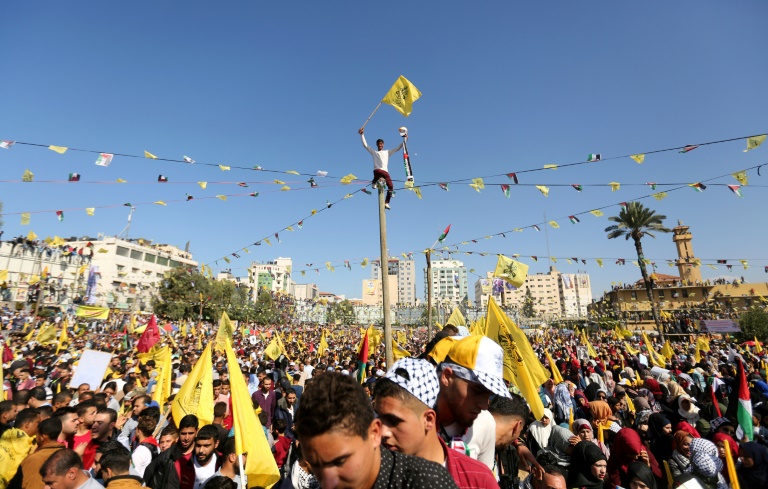‘Government incapable of solving energy crisis’: Political parties react to Stage 6 load shedding
The announcement came on the same day the leading Palestinian political factions began talks in Cairo aimed at pushing ahead with reconciliation efforts.
The suspension of meetings was not confirmed by the Americans.
“We continue to be in contact with Palestinian officials about the status of the PLO office in Washington as well as about our larger efforts to advance a lasting and comprehensive peace,” a US State Department official said.
“These discussions are ongoing.”
Palestinian foreign minister Riyad al-Malki and other officials said they had suspended all meetings, but speaking in Spain, Palestinian president Mahmud Abbas said he remained committed to working with Trump and America to achieve a lasting peace deal.
Trump has been seeking to build confidence ahead of a fresh attempt at peace talks between Israel and the Palestinians.
His envoys, including senior adviser Jared Kushner and peace negotiators Jason Greenblatt, have held dozens of meetings with Palestinians in the past year, but these could now be in jeopardy.
Vice President Mike Pence is also due in Israel and the Palestinian territories next month.
Malki said that by deciding to close the office of the Palestine Liberation Organization, the Americans had effectively cut off ties.
“What is the use of holding any meetings with them when they close our office?” he told AFP.
“In practice by closing the office they are freezing all meetings and we are making that official.”
The PLO, which the international community sees as representing all Palestinians, must have its permission to operate premises in the US capital renewed by the State Department every six months.
But last week the department refused to renew the permit.
– ‘Closing down all communication’ –
US officials cited comments by Abbas about possibly taking Israel to the International Criminal Court as justification.
A PLO spokesman confirmed they had received instructions from Abbas “regarding closing down all communication lines with the Americans”.
The row comes as Trump seeks bargaining chips in his bid to broker an elusive peace deal.
He has a 90-day window to avert the office’s closure if he deems progress has been made.
Nickolay Mladenov, the UN special coordinator for the Middle East peace process, said he was “concerned” about the plans to close the office.
“Only through constructive dialogue can we hope to advance peace,” he said.
Separately, 13 Palestinian factions including Abbas’s Fatah began three-day talks in Cairo regarding the next steps in a reconciliation agreement made last month.
The talks are being held behind closed doors.
The two largest parties — Fatah and Hamas — signed an Egyptian-sponsored unity deal on October 12 under which Islamists Hamas are supposed to cede power in the Gaza Strip by December 1.
Both parties and other smaller groups are expected to discuss several issues in Cairo, including forming a unity government and holding elections.
There have been no Palestinian parliamentary elections since Hamas seized control of Gaza in 2007 from Fatah, which dominates the government in the Israeli-occupied West Bank.
Palestinians and international powers hope implementing the unity deal could help ease the suffering of Gaza’s two million residents, who suffer from severe poverty and unemployment.
Israel has maintained a crippling decade-long blockade of Gaza, while Egypt has also largely closed its border in recent years.
– Reconciliation push –
Previous reconciliation attempts have failed.
Fatah’s delegation is headed by negotiator Azzam al-Ahmed, while on the Hamas side, deputy leader Saleh Aruri will be the highest-ranking official present.

Fatah supporters wave the Palestinian political party’s flag at a rally in Gaza City on November 11, 2017 after landmark reconciliation deal with rival Islamist movement Hamas
The October accord is supposed to see Fatah retake full control of Gaza.
In a crucial first step, Hamas handed over Gaza’s border crossings on November 1.
Control of a number of government ministries has also been transferred, but significant stumbling blocks remain.
In particular, the future of Hamas’s vast armed wing, which has fought three wars with Israel since 2008, is disputed.
Abbas has repeatedly said he will only accept one military authority in the Palestinian territories, but Hamas officials have refused to disarm.
Israel has also said it will not accept any Palestinian government that includes Hamas unless the Islamist group lays down its weapons.
The Fatah-dominated Palestinian government has also refused to remove crippling sanctions on Gaza that include reduced electricity.
On Monday, Mladenov told the UN Security Council that, despite the challenges, the reconciliation “must not be allowed to fail”.
“If it does, it will most likely result in another devastating conflict,” he said.
Download our app